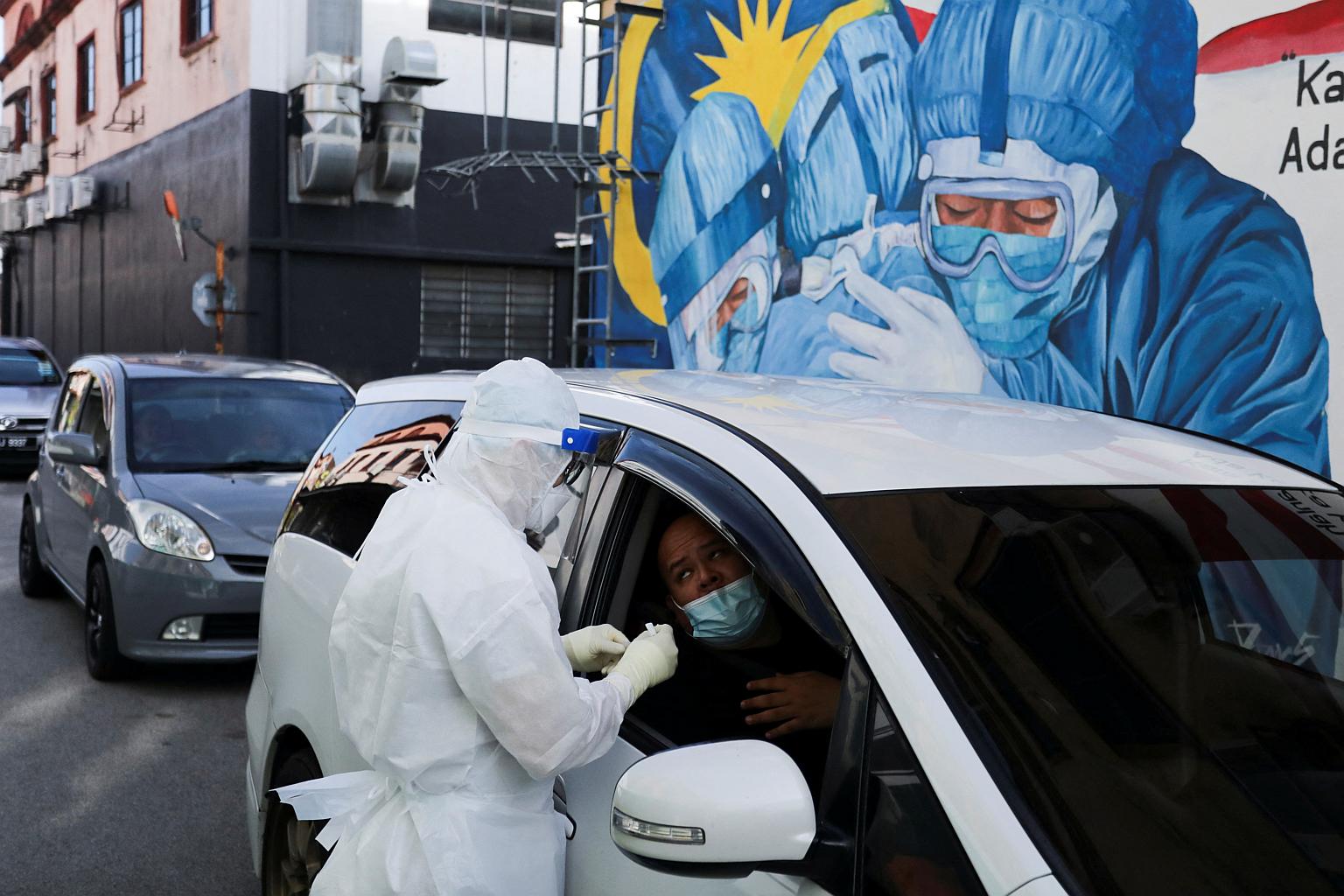Covid-19 recovery council to focus on those hardest hit as Malaysia enters endemic phase
Sign up now: Get insights on the biggest stories in Malaysia

A medical worker conducting Covid-19 nasal swab tests at a drive-in site in Shah Alam on Feb 8, 2022.
PHOTO: REUTERS
Follow topic:
MUAR, JOHOR - Malaysia will roll out a second recovery phase after it transitions to endemicity on April 1 as it is still short of reversing the damage from the Covid-19 pandemic that caused a deep recession in 2020.
National Recovery Council (NRC) chief Muhyiddin Yassin told The Straits Times that the panel's job "is far from over" as it now pivots from balancing lives and livelihoods towards getting the economy back on track.
Gross domestic product fell by 5.6 per cent in 2020 and rebounded by only 3.1 per cent last year as Malaysia grappled with a record number of coronavirus cases and more than 30,000 deaths.
"In terms of total output, we have yet to recover back to 2019 numbers," he said in an interview last Wednesday (March 9).
"It is Recovery++, not just going back to 2019 before Covid-19, but much better, because in 2019, there were already signs of global slowdown and Malaysia faced some problems."
Hence, a second National Recovery Plan (NRP 2.0) is being formulated with the help of economic experts that will focus on the hardest-hit areas - small and medium-sized enterprises (SME) and the tourism sector, as well as helping students catch up on their education.
The objective of the programme will be to ensure quality investments, higher productivity and trade so as to avoid a second slowdown in "a double-dipped growth or W-shaped recovery", he said.
Of particular concern is ensuring that SMEs can sustain themselves after the end of pandemic-era rescue packages that include loan moratoriums and wage subsidies worth hundreds of billions of ringgit.
SMEs account for 99 per cent of businesses in Malaysia, but the pandemic saw their contribution to GDP drop to 38.2 per cent in 2020, the first time the proportion has shrunk since 2003.
These small firms also made up 48 per cent of employment, down 0.9 percentage points from 2019.
"We have agreed at the NRC in the last two meetings to set up a team... with five top economic advisers to prepare and submit this plan within two months," said the former premier.
On Tuesday, International Trade and Industry Senior Minister Azmin Ali said the Cabinet would decide this week on whether to raise minimum monthly wages to RM1,500 (S$483) from RM1,200 as previously announced, and whether to exempt SMEs, which typically have lower revenues, so as not to stifle Malaysia's economic recovery.
Prime Minister Ismail Sabri Yaakob also exhorted the private sector last Friday to follow the government's move to pay employees at least RM1,500 monthly.
A senior government official told The Straits Times that if floor wages were raised, subsidies may return but with targeted parameters.
In the interview, Tan Sri Muhyiddin confirmed that NRP 2.0 could see a continuation of wage subsidies that began when he was prime minister for 17 months from March 2020.
"Wage subsidy was one of the strongest support factors during that time; otherwise, many companies couldn't sustain. What is important now is to see what the special support systems are. I'm not too sure what the government's thinking is... but obviously, SMEs are the most critical sector," he said.
Mr Muhyiddin also defended his government's record in handling the pandemic while he was in power, pointing to aid packages valued at RM530 billion and the success of the "biggest vaccination programme that the country has undertaken since our independence". It has now seen 80 per cent of the population fully inoculated.
The immunisation programme has resulted in lower death tolls and severe cases during the current Omicron wave despite higher infection numbers than last year's Delta surge.
Said Mr Muhyiddin: "While some people say we are a kerajaan gagal (Malay for "failed government"), this is pure political rhetoric.
"We did not fail, we succeeded much better than many countries in managing one of the most serious crisis. From minus 5 per cent (in 2020), this year we are projecting over 5.5 per cent growth."

